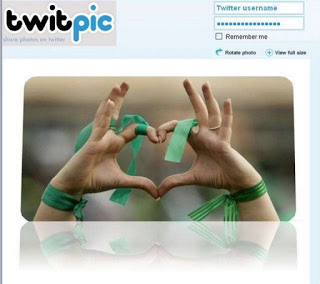Facebook, Twitter and YouTube reflected “the power of connection technologies as an accelerant of political, social, and economic change.”
 |
| AFP Twitter |
WASHINGTON (AFP) – Secretary of State Hillary Clinton Sunday highlighted the need for the US government to use Twitter and other social media to connect with young people amid turbulent change in the Middle East and North Africa.
Following revolutions in Tunisia and Egypt fueled by Facebook, Twitter and YouTube exchanges, the US State Department set up Twitter accounts last week in Farsi, Arabic and other languages to get its message across.
“What we expect to do is to be communicating through the new social media with literally millions of people around the world because we want them to hear directly from us what our policies are,” Clinton said.
“We want to use it to rebut some of the falsehoods and accusations that unfortunately are made against the United States,” she said in an interview with ABC’s “This Week” conducted Friday but broadcast Sunday.
“But mostly we want to be in the mix with this incredible young, energetic population that is seeking the same rights to express themselves as young people in the United States seek.”
In its first Twitter feeds in the Iranian language Farsi on February 13, the State Department accused Iran of hypocrisy by supporting the revolt in Egypt but seeking to prevent anti-government demonstrations in Iran.
International and local Iranian media were banned from freely covering the massive wave of protest sparked by the disputed re-election in June 2009 of President Mahmoud Ahmadinejad.
But Iranians overcame the reporting ban by using social-networking and image-sharing websites such as Twitter, Facebook, YouTube and Flickr despite efforts by local officials to cut off mobile phones and the Internet.
Clinton, making her second major speech on Internet freedom in the past year on Tuesday, announced that the State Department would also begin sending messages in Chinese, Russian and Hindi.
In her address, Clinton singled out China, Cuba, Iran, Myanmar, Syria and Vietnam as countries which practice censorship or restrict access to the Internet.
She noted that Syria had lifted a ban on Facebook and YouTube last week but convicted a teenage girl of espionage on Monday and sentenced her to five years in prison for political poetry she wrote on her blog.
Clinton described the Internet as “the public space of the 21st century — the world’s town square, classroom, marketplace, coffee house, and nightclub.”
She said protests in Egypt and Iran fueled by Facebook, Twitter and YouTube reflected “the power of connection technologies as an accelerant of political, social, and economic change.”
© AFP — Published at Activist Post with license

Be the first to comment on "Clinton says Twitter helps US tap into youth unrest"